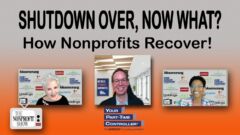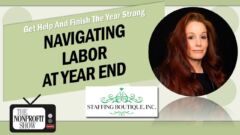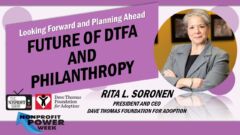
Nonprofit Management And Staffing
Build a high-performing organization with practical tools for leading people, managing performance, and shaping a culture where teams thrive.
This expert-led video collection brings real-world guidance on executive leadership, team structure, volunteer engagement, HR best practices, employee performance, and conflict management. Whether you’re hiring your first staff member or scaling a growing organization, these lessons help you align people with purpose and create workplaces rooted in mission, trust, and smart systems.
Learn how to assemble a mission-driven team, cultivate employee engagement and retention, and lead your people through change without burnout. Each episode offers actionable advice for navigating the organizational side of doing good—so your mission lasts and your people lead with confidence.

Nonprofit work is purpose-driven, but the business reality is relentless: tight budgets, heavy caseloads, public scrutiny, and a pace that rarely fits inside “normal hours.” In this episode we welcome Rahul K. Maharaj, known as “Mr. Trauma Talks,” for a timely conversation about stress, trauma, and what leaders must do to protect the people who power the mission.
Rahul opens by reframing the myth of the “fresh start.” Many professionals don’t begin January renewed they begin January carrying last year’s exhaustion into a new calendar. That’s not just personal; it’s operational. When burnout becomes normal, performance dips, turnover rises, and the mission takes the hit. Rahul offers an empowering reminder that healthy culture is not a perk it is a productivity strategy. As he puts it, “Your worth is who you are.” That message lands hard in a sector where many teams have been conditioned to endure, absorb, and keep going.
The discussion also moves into Rahul’s children’s book Mellie and the Pandemic, a “labor of love” designed to help kids name emotions and start honest conversations early. Rahul explains how the story becomes a simple bridge between children, families, and schools, giving language to feelings that otherwise turn into frustration, isolation, or silence. Connecting this to the nonprofit sector’s front-line reality: we often serve people shaped by trauma, yet we rarely address the emotional load carried by our own staff.
From social media’s role in amplifying stress to the way workplace disrespect and discrimination compound pressure, Rahul makes a clear case: mental health support belongs inside organizational strategy. He even proposes a practical model organizations can adopt placing a trusted counseling professional within the workplace to provide consistent, confidential support.
This episode is a leadership call to action: build systems that help teams stay well, so they can do well and keep the mission strong.
#NonprofitLeadership #WorkplaceWellbeing #TheNonprofitShow

We welcome Katie Warnock, CEO and Founder of Staffing Boutique, for a “New Year Trend Forecasting” conversation—focused squarely on what nonprofit leaders must do to operate smarter, steadier, and more sustainably.
Katie opens with a morale boost that’s grounded in real numbers: philanthropy is getting culturally “cool,” even as many executive directors and development leaders report that fundraising has felt exhausting and uphill. She points to GivingTuesday results and rising volunteer participation as signals that generosity isn’t disappearing—it’s changing shape. When donors can’t always give more dollars, many still show up with time and energy. And for organizations, that means the business of fundraising still comes down to relationship strength and trust built over time. As Katie puts it, “relationships matter so much… who are they giving to… all the fundraisers that they’ve stayed connected with through the years.”
From there, the conversation turns practical: AI is no longer a novelty—it’s becoming a daily operating strategy. Katie shares how nonprofits can start small and immediately reduce drag in workflows: faster acknowledgements, cleaner data entry, and smarter automations inside fundraising systems. She also describes tools that tame inbox overload and speed scheduling—freeing leaders to spend more time on high-value work that only humans can do.
Then the discussion gets candid about operating in a heated political environment. Katie suggests nonprofits create scenario-based plans that anticipate policy shifts, funding constraints, and communication traps—so boards and leaders aren’t improvising under pressure. Finally, she names what many are privately feeling: cultural fatigue. Burnout at the top is real, and retention can’t rely on salary alone. Katie offers a menu of “value-add” investments—from professional development to flexible schedules—supported by listening systems in HR and a dedicated budget line.
It’s a trend episode with a strong business bottom line: sustainable mission delivery depends on smarter systems, healthier leaders, and talent practices that actually match today’s workforce realities.
#TheNonprofitShow #NonprofitLeadership #NonprofitHR

Year-end doesn’t “arrive” in nonprofits so much as it ambushes us. And that’s exactly why this conversation with John Tiso, VP of Revenue and Service Delivery at JMT Consulting, and Buu Lìnn Tran, SVP of Financial Solutions at JMT Consulting, feels like a shot of espresso for your finance, accounting, and operations leadership.
Host Julia C. Patrick frames the real business challenge: you’re not only closing the books you’re leading humans through a high-pressure stretch where accuracy, speed, and collaboration all collide. Buu Lìnn makes the case that strong leadership is less about pushing harder and more about supporting smarter: assess what your staff truly needs, invest in process improvement, and use technology intentionally to make work easier and outcomes stronger.
John brings the mindset shift that separates “we survived year end” from “we built capacity for next year.” Organizations that resist change until it’s unavoidable end up reacting at the worst possible moment. His blunt truth is the most liberating: “Get ahead of it and you’ll be soaring high.” That applies to financial operations, system adoption, and the way leaders set expectations for learning.
A standout takeaway: training can’t be a one-and-done event. Repetition matters and Buu Lìnn offers a practical solution: short, reusable “refresh” videos that staff will actually watch, plus an easy onboarding asset when roles change midstream.
Then the conversation turns to the big nonprofit efficiency leak: fundraising and finance teams operating with separate data, separate definitions, and a quiet trust gap. The fix is proactive alignment deciding now what data you’ll need later, naming data owners, and building a unified approach so teams stop competing and start collaborating.
Finally, they zoom out to strategic tech leadership: someone must serve as the connector across departments, guiding decisions so systems and data work together instead of multiplying confusion. Bottom line: year-end leadership is not paperwork it’s performance architecture!!
#TheNonprofitShow #NonprofitLeadership #NonprofitFinance

Starting a nonprofit is often treated like a simple administrative step: fill out a few forms, wait a bit, and you’re off to the races. But in this episode, Julia C. Patrick and cohost Ellie Hume sit down with Christian LeFer, CEO of Instant Nonprofit, to talk about what it really takes to launch—and sustain—a mission-driven organization with business discipline.
Christian shares how many founders arrive at the nonprofit moment almost accidentally: the garage is full of dog crates, the community is offering in-kind support, and suddenly you need the legal structure to accept gifts, operate credibly, and stay compliant. Yet traditional paths can be slow, expensive, and confusing—often pushing would-be leaders into delays, missteps, or burnout before they’ve built momentum.
Instant Nonprofit positions itself as a modern, founder-friendly alternative: a guided, contextual process that handles formation through IRS approval and then keeps organizations on “autopilot” for ongoing maintenance. The real business takeaway is not just speed—it’s reducing operational friction so leaders can move from idea to execution without losing energy, donors, or board engagement along the way.
A memorable moment comes when Christian explains his “love letter to a bureaucrat” approach—designing filings to make a reviewer’s job easier, which accelerates outcomes and lowers risk. “Money is just a flow of energy… it’s really a river, and my job is to unblock the obstacles in that river,” he says, connecting formation, compliance, and financial management to the same leadership mindset: clarity, structure, and forward motion.
#TheNonprofitShow #NonprofitLeadership #NonprofitOperations

Founder syndrome gets tossed around like a diagnosis, but this conversation reframes it as a leadership and governance challenge that shows up in real nonprofit operations: decision rights, communication, accountability, and the organization’s ability to scale beyond one person’s willpower.
Guest Brittan Stockert (Donorbox) opens by rejecting the blame-heavy tone of the phrase and naming the real risk: “Founder syndrome is really when… you treat your nonprofit as if it’s yours personally… as opposed to something that you’re caring for on behalf of the people it’s serving.” From there, she maps how the issue can quietly spread through an organization: communication gaps, staff checking out, hesitation to propose new initiatives because leadership might swoop in, and small delays that snowball into major financial consequences. When reimbursable grants are submitted late, when board decisions stall, when donor communications feel inconsistent, funders and supporters notice. The result isn’t just drama it’s revenue disruption, talent loss, and the evaporation of institutional memory.

Finishing the year “strong” is not just a slogan for nonprofit leaders; it’s a finance and operations project. Regional Director Ellie Hume from Your Part-Time Controller walks through five concrete steps to wrap up the year with fewer surprises and more control.
She starts with yearend giving appeals. Too many organizations accidentally lock donations into narrow buckets by saying things like “your gift will buy two backpacks.” Donors then reasonably assume their dollars can only be used for that purpose. Ellie urges development and finance to work together on language so appeals connect to mission without boxing funds into restrictions the organization never intended.
Next, she turns to scenario planning and timing. December is often halfway through the fiscal year for June 30 year end organizations and just after the budget has been approved for calendar year nonprofits. That makes it a perfect time to revisit assumptions, test “what if” scenarios, and adjust to shifting funding realities instead of waiting for a crisis.
Ellie then pairs this with strategic planning, reminding viewers that a three or five year plan can’t sit on a shelf. Boards and executives need to treat it as a shared roadmap, check progress regularly, and bring staff into the conversation. As she puts it, “If your staff is not bought into your strategic plan, it's going nowhere.”
Finally, she gets very practical: start 1099 and audit preparation now. Confirm W 9s, addresses, tax IDs, and vendor coding before January chaos sets in. Pull last year’s audit checklist, gather board minutes, grant agreements, policies, and make sure reconciliations are current. That preparation reduces stress for finance, the executive director, and external partners, and it frees up capacity when the sector is under increased scrutiny.
Throughout, Ellie frames finance as a strategic partner, not just report producers. The goal is a nonprofit that is calm, compliant, and ready for whatever the new year brings.
#YearEndNonprofitFinance #NonprofitAccounting #TheNonprofitShow

Around the world, women and girls walk long distances every day to fetch water, losing education, income, and safety in the process. On this global episode of The Nonprofit Show, we welcome Shilpa Alva, founder and executive director of Surge for Water, beaming in late at night from Samarkand, Uzbekistan. From the first moments, Shilpa reframes water as a gendered economic issue, not just an infrastructure problem. As Shilpa puts it, “The water crisis is a woman’s crisis” — and it is also a profound injustice baked into race, gender, and geography.
Shilpa walks us through Surge’s “water plus” model: safe water, sanitation, hygiene, and menstrual health, all rooted in a woman centered, community owned approach. Surge does not parachute in solutions; it backs local leaders in rural Uganda, Indonesia, and Haiti so they can design and manage what their communities truly need. For nonprofit executives, the business implications are huge: the World Bank estimates a twenty one to one return for every dollar invested in comprehensive water access, yet most funders still treat water as a narrow infrastructure line item instead of a generational prosperity strategy.
The conversation then moves into power, money, and the shifting landscape of international aid. With government funding cuts shaking the sector, organizations that once relied on large public grants are now competing for the same corporate and individual donors as smaller NGOs. Surge has navigated this by diversifying its revenue model between the United States and Dubai, and by building creative fundraising events that attract sectors like design and architecture into the water conversation.
Shilpa is candid about decolonial practice and the uncomfortable truth that international NGOs are part of a historic power structure. Surge actively works to reduce that power imbalance so local partners shape solutions and control implementation. SurgeForWater.org shows us all how to align mission, funding strategy, equity, and storytelling.
#TheNonprofitShow #WaterJustice #WomenInLeadership

Labor myth buster Dana Scurlock, Director of Recruitment at Staffing Boutique, reframes temporary staffing as a sophisticated business tool for nonprofit leaders—not a last-resort move when things are on fire. Dana steps in to show how strategic temp and temp-to-perm staffing can stabilize teams, protect budgets, and protect sanity.
She starts with a fundamental question: how many staffing firms does a nonprofit really need? From organizations that have never used an agency to those calling their fifth recruiter, she explains why understanding an agency’s model matters. Staffing Boutique works on a contingency basis, which means urgency, flexibility, and the freedom for nonprofits to keep recruiting on their own. In contrast, ‘retained’ firms require exclusivity and upfront fees, which can slow things down and lock organizations into one channel.
Dana is equally direct about transparency. Salary ranges, the history of the role, why the previous person left, whether someone is quietly being replaced—these details aren’t gossip; they’re the bedrock of a solid search. Without that clarity, candidates endure endless interviews only to discover the compensation was never realistic. As Dana puts it, “It’s not just an interview for them. It’s an interview for you to see if it’s the right place where you want to work.” That two-way lens is exactly what reduces turnover and builds longer tenures in mission-essential roles like development.
Then she pulls back the curtain on the economics. That apparently “high” hourly bill rate often includes recruiting, weekly payroll, taxes, unemployment, and insurance—costs nonprofits would shoulder anyway. Agencies absorb administrative burden and even handle tough conversations when a placement isn’t working out or a project ends. For conflict-averse leaders, that alone can be priceless.
Dana also defends temp work as a legitimate career choice, from interim executive directors steering transitions to seasoned admin professionals who thrive on variety. In her world, temp staffing is not about “just getting a body in the seat”; it’s about building smart, flexible staffing strategies that support the long-term health of nonprofit organizations.
#TheNonprofitShow #NonprofitStaffing #TempWorkStrategy

A valuable and thought-provoking conversation with Carrie Wright, consultant and coach at Wright Consulting. Joined by cohosts Julia C. Patrick and Wendy F. Adams, Carrie guides leaders toward a more thoughtful, rigorous, and human-centered approach to nonprofit organizational performance.
Rather than rushing into resolutions and planning cycles, Carrie urges leaders to adopt a practice of year-end reflection—an intentional look backward before charting the year ahead. As she states, “There’s a saying that ignorance is bliss, but I genuinely believe that knowledge is power.” That philosophy becomes the cornerstone of her framework: understand what fueled the team, what depleted it, and what priorities still belong at the table.
Carrie challenges organizations to treat mission, vision, and values not as decorative phrases, but as practical tools that recalibrate purpose. When teams drift from their “why,” burnout rises and cohesion dissolves. One method she employs is asking every team member to restate the mission in their own words and connect it directly to their daily responsibilities. This creates clarity, alignment, and ultimately ownership—an essential sequence for high-performing teams.
Quarterly rhythms also play a central role in Carrie’s approach. Instead of waiting an entire year to revisit goals or assess team health, she encourages predictable check-ins, extended conversations, and off-site sessions where challenges, ideas, and wins can surface in psychologically safe ways. These rhythms reduce confusion, prevent moving targets, and strengthen trust through consistency.
Carrie also emphasizes leadership development at every level. With her mantra, “Lead from where you sit,” she reframes leadership as an act accessible to all staff—not a title. This perspective urges team members to examine their habits, define one development goal, and consider what needs to be eliminated, automated, or delegated to make true progress.
Finally, she offers a compelling metaphor: culture as a thermostat—not something you set and ignore, but something requiring constant monitoring. Pulse checks, real communication, and people-first decisions are essential to preventing turnover and maintaining momentum.
With clarity, warmth, and strategic depth, Carrie presents a blueprint for nonprofits seeking resilience and alignment in the year ahead.
#TheNonprofitShow #NonprofitLeadership #TeamCulture

Interim leadership is no longer just a stopgap in the executive director’s seat—it’s becoming a strategic engine for sustainable fundraising. Joan Brown, Chief Operating Officer at Interim Executives Academy, and David M. Nicole, CFRE, founder of Headwinds Consulting, share why interim development leadership may be one of the most underused tools in the nonprofit sector.
Together, Joan and David contrast short-term revenue fantasies with the realistic, process-based nature of fundraising. They call out unrealistic expectations—boards and CEOs who imagine the interim will arrive with a magic button and instant major gifts—and instead emphasize assessments, strategy teams, and shared ownership across staff, board, and executive leadership.
Joan opens by reframing the “interim world” as an intentional, structured response to leadership transitions, not just a temporary patch. Interims, she explains, aren’t there to keep a chair warm; they’re there to guide organizations through CEO, COO, and chief development officer transitions with clarity, planning, and structure. With turnover rising and leadership expectations evolving, the data point is clear: every leader leaves, so organizations need a plan that goes beyond wishful thinking.
David brings numbers and nuance from his six interim roles—split between CEO/executive director and development director positions. He describes a model where interim development directors are explicitly hired with clear objectives, defined timelines (often 12–18 months), and a mandate to build systems, not personal empires. His philosophy is summed up in a powerful line:
“My success is not necessarily what I accomplish while I'm there. My success is measured by what the organization accomplishes after I leave.”
The conversation also explores how donors and funders respond when organizations are transparent about using interim leaders. Surprisingly, many donors appreciate the foresight, especially when the message shifts from “we’re in crisis” to “we’re investing in long-term stability.” Community funders are beginning to require succession plans and even encourage interim solutions as a sign of sound governance.
You’ll agree, interim development leadership looks less like a temporary fix and more like a strategic on-ramp to sustainable fundraising, stronger boards, and healthier organizations!!
#TheNonprofitShow #InterimLeadership #NonprofitFundraising

What happens when a kid who scribbles “play soccer at Ohio State” in kindergarten actually does it—and then decides his story shouldn’t be the exception? That question sits at the center of this episode with Channing Chasten, professional athlete and founder of The One Percent Kid Foundation.
From the start, Channing describes a childhood shaped by two steady forces: the soccer pitch and a mother who refused to let academics trail behind. Homework came first, the ball came second. Years later, that same mix of discipline and imagination is now driving a nonprofit built on three pillars: soccer, literacy, and mindset.
Channing explains why he believes in the power of tiny, consistent gains instead of giant leaps. As he puts it, “If you break it down into a small step, you realize starting is the easy part.” That simple idea—1% better every day—guides everything from his youth programs to his fundraising strategy.
We follow his journey through literacy camps where reading comes before drills, turning books into the ticket to soccer practice. He shares what he’s learning about plummeting reading scores, the heartbreaking link between third-grade literacy and incarceration, and why his team expanded from early grades to high schoolers who have already fallen behind.
The story widens as he walks through how he built a board full of nonprofit veterans and soccer leaders, deliberately choosing people who know both the sport and the sector. Their mentoring shapes his ambitions: building a national model starting in Arizona, creating mindset workshops in schools, and eventually launching a scholarship fund for under-resourced students who come through the program.
Along the way, we glimpse the grind behind the dream: chasing grants, securing a city award from Chandler, collecting impact data, filming quality videos so donors can actually see the work, and constantly revisiting big revenue targets in six- and twelve-month windows.
By the end, The One Percent Kid isn’t just a catchy name—it feels like an invitation to kids, donors, and communities to believe that small, steady progress can rewrite a life story.
#TheNonprofitShow #YouthSoccer #LiteracyMatters

Federal shutdown over! Systems rebooting! Nonprofits on the clock! In this urgent episode, we bring back Derick Dreher, Department Leader, Government Funding at Your Part-Time Controller (YPTC)—just hours after the government reopens from the longest shutdown in U.S. history.
Derick starts with what happened in Washington: failed Senate votes, a last-minute continuing resolution, and a deal that funds government operations into January while restoring budgets for agencies like USDA and programs such as SNAP. But this is not just a civics lesson; it’s a compliance wake-up call for every nonprofit with federal awards.
Even though agencies were closed and portals were offline, he reminds viewers that obligations never went away. As Derick puts it, “It’s a challenge, but you still have to do it.” Reports due during the shutdown are still due. If a federal portal was off, organizations should have emailed, mailed certified copies, and documented every step. That paper trail may be the difference between a simple explanation and a “you’re in breach” notice now that systems are back up.
Derick explains that rules are shifting at the same time pressure is rising. An August executive order on federal grantmaking is reshaping Uniform Guidance and, in some cases, contradicting existing regulations. Nonprofits cannot simply move programs from October to November or rework budgets on their own. Any change—timelines, program design, vendors—requires permission.
The human side of this story is just as urgent. Federal employees returning from 43 days of furlough are staring at thousands of unread messages, while agencies are already dealing with staffing shortages. Automated payments and notices may resume quickly, but nuanced approvals, extensions, and clarifications will take time. That means nonprofits must expect delays while still operating at peak year-end demand and navigating food insecurity, SNAP disruption, and stretched donors.
Derick calls on leaders to treat this as a mini audit moment: review every award, update budgets and reports, clarify what did and didn’t happen during the shutdown, and then proactively request extensions and changes. “Federal awards are complicated beasts that have a lot of details and a lot of moving parts, and there’s no reason to be afraid of accepting them,” he says—if leaders build strong internal controls for timesheets, receipts, and documentation.
Above all, think of this as a reframe of the relationship with government funders: not as begging with an outstretched hand, but as a handshake partnership where authenticity, preparation, and transparency show you are leading with excellence. Get organized now, communicate wisely, and you can turn this chaotic shutdown into a proving ground for your nonprofit’s strength and mission focus.
#TheNonprofitShow #NonprofitFinance #GovernmentGrants

Nonprofits can absolutely finish the year strong—especially when they treat staffing as a strategic tool, not a scramble! In this energizing convo, Katie Warnock, founder and president of Staffing Boutique, maps out practical ways organizations can add capacity right when it matters most. Katie is plainspoken and solution-oriented: for major fundraising events, she recommends planning eight to nine months out and matching roles to real workload. “First of all, if you don’t have an events director, get one. If that’s not feasible, bring in a seasoned temp events director or an events manager to handle day-to-day logistics.” That approach keeps development leaders focused on relationships and revenue instead of table charts and coat checks!!
Katie outlines flexible staffing ramps—lighter hours early, surging near event day, then tight close-out to ensure donations, acknowledgments, and data entry are flawless. She is equally direct on year-end donor support: bring in skilled database professionals familiar with your CRM to process gifts fast and accurately. Volunteers are wonderful, but gift integrity demands pros.
Volunteer management gets a reality check. Holiday enthusiasm is great, but sustained help across the calendar—June, August, February—changes outcomes. Katie urges orgs to capture individual contacts from corporate volunteer days and cultivate them directly; today’s 22–32 year-olds become tomorrow’s major donors and often bring corporate dollars with them.
Looking beyond December 31, Katie champions prep projects that set teams up for a calm, effective new year: digitizing archives, standardizing folders and calendars, and documenting processes. She even shares a personal productivity win: embracing AI to tame an overloaded inbox. “Embrace AI… it’s here and it’s making so many things so much easier.” Finally, she models healthy team norms—blocks of focused work, breaks for movement and sunlight, and clarity on priorities—so coverage feels near 24/7 without burning people out.
Bottom line: think earlier, staff smarter, protect data, convert volunteers to champions, and set up systems now so January starts smooth. With the right mix of temps, consultants, and clear processes, your organization can thrive through year end and launch into the new year organized, energized, and ready to grow.

In this capstone to Nonprofit Power Week, Rita L. Soronen, President and CEO of the Dave Thomas Foundation for Adoption, looks forward—past the news cycle and into the work that will shape children, families, and the sector. In a calm, mentoring tone, Rita keeps leaders grounded in first principles: start with the child. As she puts it, “We’re not finding what child is best for a family, we’re finding what family is best for a child.” That mindset reframes recruitment, kinship care, and inclusion, and it calls leaders to stretch their own practices.
Rita shares how public attitudes toward foster care and adoption have matured, yet can backslide when sensational stories appear. Her counsel: hold firm to truth, trauma awareness, and mental health supports. She offers a practical compass for politicized climates: begin where everyone can agree. “Anyone here who’s ever been a child, please raise your hand… We have to bring it back to what’s best for children.” From there, leaders can convene consensus, reduce noise, and invite real collaboration across agencies, movements, and communities.
On funding and donor behavior, Rita maps the changing landscape—fewer donors, larger gifts, and strong interest in measurable impact and systemic change. The lesson for leaders is balance: keep legacy channels available while building digital fluency and fluency in donor-advised funds, non-cash assets, and planned giving. Pair that with scenario planning so your organization is resilient when markets, tax policy, or public health winds shift.
Rita’s advice on next-gen leadership is both warm and direct. Embrace impatience for progress, mentor toward mastery, and translate across generations. Model curiosity over eye-rolls; teach how boards govern, how budgets work, and how durable change is built—without dampening the urgency younger leaders bring.
Finally, Rita urges courage without fear. Hold your mission steady when funding anxieties rise. Convene unusual allies. Keep articulating the value of childhood, permanency, and family—then amplify shared ground loudly. Leaders who do this will guide teams and donors through uncertainty and keep children at the center, where they belong.
#TheNonprofitShow #Adoption #FosterCare

On this special Halloween edition of #TheNonprofitShow, Host Julia C. Patrick welcomes “Countess” Justine Townsend of Your Part-Time Controller (YPTC), to turn board governance fears into practical know-how. Capes, cobwebs, and clever metaphors aside, the lesson is real: fiduciary duties aren’t folklore; they’re law. As Justine explains, “you have a legal and ethical obligation to act on behalf of the organization with their best interest in heart.” Miss that, and the consequences can rattle a boardroom harder than a thunderclap.
First comes the duty of care. Think: show up, read the financials, ask questions, and make informed decisions. The monster here is the “ghost board member”—present in name only—who fails to notice a growing payroll tax balance. When the feds knock, there’s no hiding in the attic. Justine’s warning is blunt: “D&O insurance does not cover unpaid payroll taxes.” That’s a real-world jump scare.
Next is the duty of loyalty—less about blind allegiance and more about putting the organization’s interests ahead of your own. Enter the “vampire board member,” pushing a property sale that benefits them more than the nonprofit. The cure: annual conflict-of-interest disclosures, board recusals, and transparency. Bonus: checking the policy box (and posting it on your website) earns trust points with watchdogs like Candid.
Finally, the duty of obedience. No, not the toddler version. This means honoring laws, policies, donor restrictions, and—crucially—the mission. Beware the “zombie board member,” shambling after “money, money, money” while letting programs drift off-mission. That’s how donor restrictions get broken and how repayment claims can rise from the grave. File the Form 990 on time, disclose program changes, and keep mission, vision, and values stitched tightly together.
Throughout, Julia and Justine keep it witty and useful: schedule your COI renewals before year-end, disclose changes on the 990, and use fiscal sponsorship wisely during early program stages. The closing charm? A simple mnemonic: care (do the work), loyalty (put the org first), obedience (follow the rules). With that, your board won’t just survive spooky season—it’ll thrive all year.
#NonprofitFinance #BoardGovernance #TheNonprofitShow
